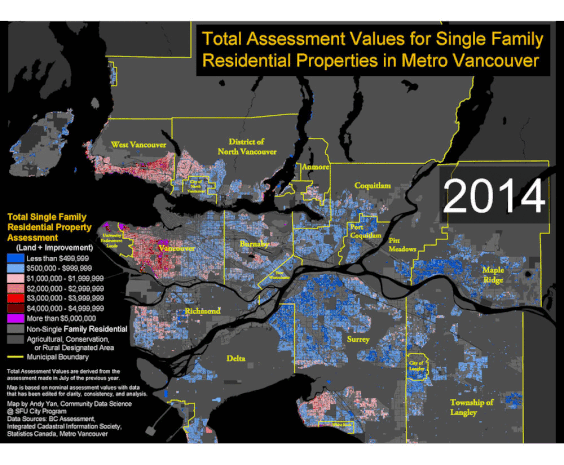Are Your Neighbours Among The World's Wealthiest 1%?
Reflections from Gen Squeeze Supporter Jay Garlough
Today we’re excited to share a guest post from Jay Garlough, a friend of Generation Squeeze.
In the post, Jay explores a question that might at first sound silly: How many of the world's wealthiest 1% live in your neighbourhood?
I was surprised by his findings, and I think you will be too.
Let’s get into it.
“How many of the wealthiest people in the world live in our City?” Ten years ago, at a community consultation, I asked this question to my MP and City Councilor – and they thought I was joking.
Yet when another attendee inquired about the poorest residents in our community, they had lots of information, including statistics and maps. The MP and City Councilor listed dozens of relevant contacts working on poverty reduction, including non-profits, advocacy networks, community foundations, university groups and professors.
This got me wondering – why do we know so much about poverty, yet so little about wealth, in our communities?
According to the World Inequality Database, a net worth of $809,775 Canadian Dollars puts you in the world's wealthiest 1%. Net worth is different from income, which is oftentimes used to measure financial well-being. This distinction is important in Canada, where many people with moderate incomes are extremely wealthy, largely due to the equity they’ve built in their homes.
The Homeownership Windfall: A Tale of Soaring Values
The MLS Home Price Index is a great tool to explore the staggering wealth accumulation by average Canadians who've ridden the wave of soaring home prices. From bustling metropolises to quieter towns, real estate has become a golden ticket. An average Canadian 2 bedroom single family home worth $300,000 less than 20 years ago is now valued at $969,800. Growth was even greater in many cities and suburban areas.

Amidst the backdrop of soaring housing costs, some may be surprised to learn that half of households that own their home in Vancouver are mortgage-free, according to data from Andy Yan from Simon Fraser University’s City Program. And most of these mortgage-free households are in the city’s most expensive neighbourhoods. This pattern isn't unique to Vancouver: 43% of Toronto owner households are without mortgages, with similar rates in Kelowna (42%), and Calgary (35%).
So, circling back to the question that sparked laughter: Yes, if you live in many Canadian cities, one of the world’s wealthiest 1% likely does live in your neighbourhood. This revelation isn't about flaunting riches. Rather, it's an eye-opener to the quiet accumulation of wealth in well-loved, long-inhabited homes.
Ten years ago, I knew that many in my community lived under Canada’s poverty line, and I had suspicions that some of the wealthiest individuals in the world lived here too. However, never did I think that it would be possible for one person to fall into both categories. We measure poverty using incomes. This means that it’s possible for a retired older Canadian with a low income to be considered poor, despite being one of the 1% wealthiest people on the entire planet due to the elevated price of their home.
I hope these ideas act as a nudge to better understand wealth and poverty in your own neighbourhood, to blend the global context into your conversations on wealth and income, as we work to bridge generational divides, ensuring fairness and equity across all ages.
As Jay illustrates, some (mostly older) Canadians have joined the ranks of the world’s wealthiest due to the appreciation of the value of their homes. They have accumulated much of this wealth, which comes at the expense of younger people, simply by winning the lottery of timing. Yet the bigger the wealth windfalls accrued by one generation of homeowners, the larger the mortgages of the next. So can we not ask them to contribute a small amount of that wealth to building a better future for younger and future generations of Canadians?
That’s all for this time, thanks for reading!









Great post! Let alone wealth, current poverty measures often don't even measure *income* all that well. The Market Basket Measure has a really coarse adjustment for the reduction in shelter costs for paid-off homes, which I believe they are considering adjusting to reflect that homeowners near the end of their mortgages often have cost advantages over renters. (Even with rising interest rates now affecting many, the average existing mortgage payment is lower than the average rent!) Effectively, it reduces the shelter component of the measure. But it doesn't have anything that accounts for the fact that older homeowners are often just consuming way more housing than renters, and way more housing than is a basic need. Where I live a detached 3 bedroom home might rent for 3.5k, and a 1 bedroom apartment around 2k -- that's a ton of 'extra' consumption beyond the basics that a home is allowing but that isn't being counted. From another perspective, that home is providing the same value as 42k a year (!!) of income, which if it were cash income would put a single person or a couple above the MBM poverty line in every region of the country.
There's a good case that's not actually something you want to factor in as "income" in an official poverty measurement, even if it were easy to measure, because people are likely to cut back on other things they need before downsizing or renting out a room and it's not as easily available as cash income like Beth pointed out in another comment. (You're unlikely to even convince homeowners this is real income!) But, it is still such a huge hidden difference between the financial situations of long-time homeowners and everyone else.
I see this in my community as well. Given the poverty measures by income and the lack of affordable rentals or options to downsize, what policy options do you see available to unlock some of the paper / real estate wealth in a more equitable way?